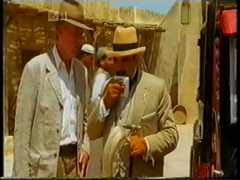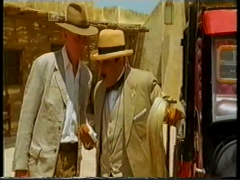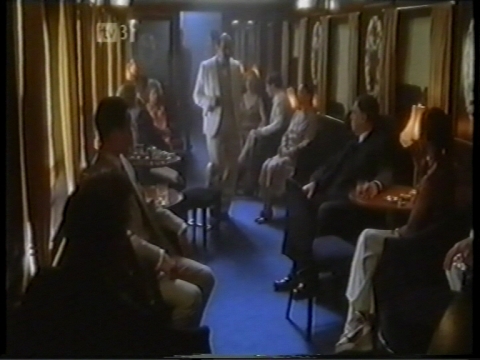Part 7
My favourite leading lady...
Suchet: Iíve had so many wonderful leading ladies that it would be almost invidious, I mean, obviously my first choice would be Pauline Moran, who plays Miss Lemon, but thatís, in a sense, that is not a leading - leading lady, in, er, in, er, sheís not with me al the way through each episode. I would like to pick one, actually, if I had to, and I - will have to, Iíll pick Elisabeth Dermot Walsh, who plays Ellinor Carlisle, in Sad Cypress. I think her performance in that film - for me was... just extraordinary. There is one scene in particular I remember, when Poirot visits her in the jail, and sheís acting one side of the glass, and Poirot is at the other side of the glass. And....... sheís in a class of her own! Thatís when it works, when people really act from their heart, and the best leading ladies - work from that and therefore engage with Poirot on a very truthful level. If they take him seriously - him, me, me, him - seriously - you will, too...
Elisabeth Dermot Walsh: David has an amazing quality, where - h-he just is Poirot, when heís acting, and heís, er, playing the character. And even though we were looking through the glass at each other, it was just very easy to forget that there were cameras there, and it was too hot and... because we were to play this really quite intimate scene - almost more intimately than if there hadnít been a peace of glass between us - because with that protection we could be much more, sort of - open with each other, or I-my character could be with him, obviously, Hercule is obviously very guarded, always...
Poirot...
- leaves...
- a devastated Ellinor behind glass...
Elisabeth Dermot Walsh: He remains in character all day on set, which is - so [brilliant ?] for [to ?] maintain the kind of reality of what we are trying to - do... It was delightful to touch him, as Poirot, and - there are some, there is a party sequence, I think, where we have a sort of chat, where we first meet. And, er - we had a chance to have a bit of a chat, as Ellinor and Poirot, which was like really charming and delightful, and we knew, you know, that we were just playing, but it really helped with playing subsequent scenes as well - to have little chats in character, but with a twinkle in each others eyes, knowing that we were just pretending and playing...
The lovely Elisabeth Dermot Walsh telling about her co-work with Suchet...
Suchet: One of the most exciting episodes I played was, er, The Chocolate Box. It presented so many challenges for me, because I, you will see Poirot for o-the first time ever as a young police-officer - as well as the middle aged Poirot. So I had to almost work backwards for that character to find the young Poirot. But whatís special - is in that - episode - he does fall in love - and he falls in love with a beautiful girl called Virginie Mesnard, played by Anna Chancellor. And itís in this episode, that he gets given his lit-tle silver - vase, er, that he wears as a broche. And people have always asked me, where did I get that from, where does Poirot get that from - well, he got it from Virginie Mesnard, from a girl that he fell in love with, in The Chocolate Box...
The little silver vase...
- Poirot got from Virginie Mesnard...
- a girl, he fell in love with...
End of Part 7
Part 8
Poirot almost gets it wrongÖ
Suchet: Poirot - has no doubt that heís always going to be right. I mean, th-this is - as far as heís concerned: [Poirot shows up in a clip from an episode, saying: ďI am the best! I am Hercule Poirot!Ē] - and he doesnít say that modestly! [While laughing]: He is not a, a modest man. He believes it - er, and, and, er, he is right! Er - he thinks that - Sherlock Holmes is very good, er, but itís fiction...! [laughs for a long time and says]: Ah - love it! And, er, he, he is not, he is real. And of course, er, as far as heís concerned, thereís no [switch to Poirot accent]: ďthere is never any doubt that it would be so, because I am Hercule Poirot, ah!ď
"I am the best!"
"I am Hercule Poirot!"
But he sometimes gets caught out, and very often, er, both in the books and in our series you see Poirot very nearly getting it wrong. And I suppose it is one of the few times that you really see Poirot getting emotional, when he gets it wrong. But when he does get it wrong, he has no [?] at all, [he is ?] getting very angry with himself and calling himself an idiot and an imbecile! And er - er, er, sometimes he will call himself a [switch to Poirot accent] "dimwit!". Er, something completely out of character, because heíd never normally admit to this sort of thing... And Sad Cypress, very, very much so he gets caught out, and admits - er, to somebody in the room, what an idiot he is, and thatís quite, you know, as a character to tell another character - [switch to Poirot accent]: ďI am an imbecile!................" Poirot does it, because thatís heís greatest crime to himself! Getting it wrong! He could never get it wrong.....
I remember when, when Poirot went to the theatre once, he doesnít get to the theatre that much, but he went to the theatre once (he was persuaded to go to the theatre), to watch a who-dunnit - ah, [Coast ?] to Newcastle theme [laughs] anyway, he went, and, er - halfway through the, the play, he wrote down, who the, er, culprit was. The culprit was not the same as Poirot thought it was... - but he thought the author was wrong! He was not wrong, the author was wrong! So, er, he came out and saying [switch to Poirot accent]: ďNo, no Hastings, it is not possible, it cannot be possible, that person could not have [while laughing] committed the crime... ď Well, I mean, the cheek of the man... I do adore him...
The expression on Poirot's face when the person who "did-it" turns out to be some- one else than expected...
See, often, nearly always has Poirot have a moment of revelation, when he knows the truth, and - very often heíll just be sitting very quietly with his eyes closed - green eyes by the way, and if you look closely [Suchet looks directly into the camera, eyes wide open] - mine are brown. But when we started doing the series, I didnít, I couldnít wear - colour contact lenses, [I felt ?] rather relieved I couldnít, because I, you just have to [?] with the fact that my eyes are not his colour. I think thatís about the only thing - er, th-where we differ, but - what he, what she says is, with his eyes closed - he will think and meditate upon - the crime, and then he gets this moment of revelation, and he will smile, and the eyes will open and glow greener than before. But heís very famous with just keeping his eyes closed [Suchet closes his eyes and demonstrates Poirotís expression during meditation and revelation and then suddenly opens his eyes, saying]: ďGot it! - Got it!Ē And everybody knows, he has... !
A moment of meditation and revelation...
Got it! Got it!
End of Part 8
Part 9
My most challenging locationÖ
Suchet: I do remember this, I mean, er, I, I really donít want to film there again in the heat, and that was Tunesia. And it was so hot, I was sitting in the car, and I had to drive in - and stop, get out of the car and walk into - the building. Simple as that. That was the shot. But I was left for some time, waiting, while the camera was f-set up and everything, and my car had no roof on, so it was a convertible - and, I didnít realise it, well, I felt all right, but I drove in - on action, drove in, opened the door... goo, er, stood up on the pavement - and collapsed! I had to be given oxygen, I had, er, almost heat [?], so that, that was, er... that was not funny!


Well, because I, you know, I w-wore, Iím-I got this wing collar and tie, and then I got the padding underneath that, you know, the big padding and the waist coat and the... er, in temperatures that were really, really up in the thirties - really high, but the most challenging location, as far as acting was concerned, has to be The Blue Train. Oh, yes, you know, itís gotta be The Blue Train. Although there are a lot of, er, lovely exteriors in Cannes, and wonderful, but when it came to - the summing up... we built the train! There was the train! In all its confines, literally confines, and that was proved to be the most difficult summing up, Iíd ever had to do, because all the suspects were in a line, and I had this narrow little corridor to walk down... - and very difficult to get camera angles for the camera crew... and, and, er - it was very, very challenging and very hot inside the studio, we were doing it in the summer, as well... I was always in front of the people, that I was confronting, I - I couldnít go behind... Sometimes when Poirot goes behind the chair, you can see the person - aware that heís there and all that, but this was absolutely face to face with every s-character that I had to, had to confront. And in the end, funnily enough - if Iím allowed to say this - I think itís probably one of the most exciting.

Summing up...
- on very little space...
- face to face...
If you like the - coup de thť‚tre for Poirot, itís the summing up, I mean, that is, because he could - I mean, Agatha Christie could - have had Poirot come in, into the drawing room or The Blue Train or wherever and say - [switch to Poirot accent]: ďIt was you!Ē Er, but he does, er, she doesnít have that. He knows who it is, and yet he puts [burst into laughter] he putís everybody through hell! He makes everybody feel guilty! And, er - he goes on for a very long time in the books, and on every television show it is the last act. The whole of the last act is Poirot summing up, and for me, the actor, of course is, is, is, is glorious, because it is my peace of theatre, as well as Poirotís peace of theatre... I look forward to it and dread it at the same time... Itís become a very big moment in the, for the viewing public, and in fact Iíve got several letters at home, which tell me - that... theyíre watching the, er - episode - live, at home... start recording when I start my summing up. They all go out and have dinner... they come back... - and during dinner they have laid, lay bets on, who they think - have committed the crime...! And then they play my summing up! To see who was right...
End of Part 9
January 2008 © All rights reserved
